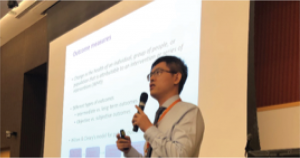
HTA Training on Health Technology Assessment: Selecting the Best Value Care
By Ritika Kapoor
HIPER- Health Intervention and Policy Evaluation Research unit has been launched at the Saw Swee Hock School of Public Health, National University of Singapore. Based on the vision of “Evidence Empower Decisions”, this unit has been established with an aim to grow HTA capacity in the developing countries who are facing challenges in allocating resources in an appropriate way to inform healthcare priority setting. The launch of the unit witnessed an exciting and comprehensive two-day training program to provide an overview of how to conduct and use HTA to support decision-making about health policy at the national level. The course was aimed at a target audience of policymakers, healthcare professionals involved in developing and/or introducing new technologies, healthcare managers who work on evaluating or implementing health policies or programmes, researchers, academicians and professionals from pharmaceutical industry or consulting services. The training was held from 8-9th January 2019 at the NUS campus, Singapore.
Attended by around 80 participants, from more than 10 countries in the region including Ghana, Hong Kong, Thailand, India, Indonesia, Malaysia, Philippines and Singapore, the training received immense encouragement and applauds from the participants. 60 out of 80 participants submitted their feedback reporting a 95% or higher satisfaction rate with all the individual sessions and 100% of them considering this session to be a great learning experience and a good value for money. Appreciative comments like “great mix of theory and exercise”, “well organized and well timed” and “excellent lectures” from the attendees were very reassuring. Multiple requests were received for conducting such trainings more frequently, organizing more in-depth training sessions and customizing such events to address medical device innovation challenges along with policy making. The enthusiasm of the participants was enthralling, with a whole room of diverse audience working together for 8 hours each day to learn and implement HTA.
Organized in collaboration with HITAP (Health Intervention and Technology Assessment Program), Thailand, the training program aimed at providing an overview of the processes involved in conducting a HTA assessment and also introduced technical details of performing health technology assessment (HTA).The first day focussed more on understanding what HTA defines and its currently used applications in informing national health policy, and health investments and disinvestments decisions. Using examples of HTA application in policy making in Singapore, Thailand and England, audience were explained about the step by step process of conducting HTA and the involved challenges. This included individual sessions on identifying the right topics for HTA, selecting the right approach to translate policy questions to research questions, explanation of the different types of methodological approaches and how to identify the relevant approach to address the policy relevant research question. Sessions focussed on providing technical skills included details on evidence synthesis with related methodological issues in conducting such evaluations (systematic reviews and meta-analysis) and the good practices, costing studies (identification, measuring and valuation) and identifying the required outcome measures (DALY/ QALY) with an elaboration of the different health-state evaluation techniques (RS, SG, TTO, EQ-5D, SF-6D, HUI3). The first day ended with a hands-on exercise on outcomes measures where participants used EQ-5D methodology to calculate their utilities for three different health conditions (current health, blindness and paraplegia) and performed a comparative analysis of their utility results using Singapore and Thai value sets. The participants were seen enjoying the learning process and were quite enthusiastic with the hands-on exercise on outcome measure evaluation.

A/Prof. Luo Nan teaching the lecture on Outcomes Measures on day 1 of the training
The next day started with a discussion with the participants on how their responses from their last day exercise looked. Along with revising the concepts from the day 1 training, it was the day focussed on not only learning new concepts but engaging in hands on exercises. The sessions started with introduction to the details of the different modelling techniques and was followed by modelling exercise, where each individual focussed all their knowledge and training on solving a public health policy question using simple decision tree and markov models. It was followed with budget impact analysis and then understanding the social and ethical considerations in HTA. Equipped with the understanding of the need and methodology for conducting HTA, the remaining of the training focussed on making the audience understand the practical challenges in conducting HTA and an HTA impact evaluation with information on existing HTA systems in India, Indonesia, Singapore and Thailand. A final hands-on exercise was conducted which needed the participants to design a study to answer a policy question. This exercise performed with google forms were evaluated on the spot, explaining the participants how their answers fared in comparison to their peers.

The team of teaching assistant’s victory picture with Dr. Yot after the event
The training was exceptionally well organized with a motivated team from the NUS school of public health and HITAP, Thailand working endlessly together to ensure a flawless event. This training event inaugurates the collaboration in between HIPER and HITAP and marks new beginnings of accelerating the dialogue, skillset and application of HTA in countries worldwide.


